
views
Know that chlamydia is common and treatable.

Remaining calm after a diagnosis keeps you from panicking. Feelings of anxiety are natural after finding out you have chlamydia, but by reminding yourself that STIs are a common and normal part of being sexually active, you can keep your emotions under control. Go into your conversation with your boyfriend feeling confident and mature. Understand that getting chlamydia from your boyfriend doesn’t necessarily mean he cheated on you. 50% of men remain asymptomatic with chlamydia, so he might have gotten it before you were in a relationship. If you haven’t tested positive for chlamydia, you might not have it. Urinary tract infections (UTIs) can have similar symptoms, so visit a doctor to be sure of your diagnosis. Common symptoms of UTIs include burning with urination, urinary urgency or frequency. If you have a urinary infection, you may have lower abdominal or back pain. There may be leakage of urination.
Get the facts on chlamydia before you do anything else.
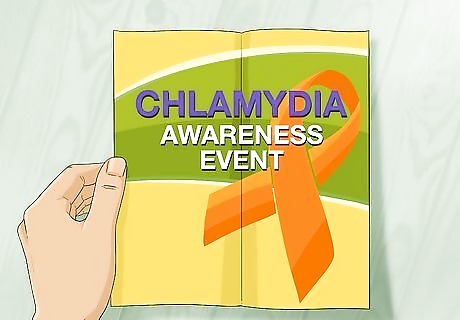
Being informed on chlamydia can help you navigate this conversation. It’s important to remember that an STI is not the end of the world. Chlamydia is both common and easily treatable, but if ignored can cause serious health issues. Talk to your doctor or ask questions at your testing center so that you can give your boyfriend and yourself accurate information. Your doctor or testing center will likely have pamphlets or other informational resources that you can take with you. Bringing these to the conversation can help your boyfriend answer any questions he might have.
Tell your boyfriend in person as soon as possible.

Talking about chlamydia early can keep your boyfriend from getting reinfected. Being reinfected with chlamydia is extremely common, but letting your boyfriend know that he’ll need to be tested and treated can keep this from happening. Schedule this conversation as soon as possible, and definitely before you have sex with him again. Try sending him a text like, “I don’t want you to be anxious, but there’s something you should know. Can we meet tonight?” Consider your boyfriend’s personality when deciding how you want to talk about this issue. If you think he might cause a scene, but would still prefer to talk to him in person, try choosing a public place to talk. If you’re worried about your boyfriend’s reaction, it’s okay to talk on the phone. While texting isn’t the best way to talk about serious issues, it’s better to notify him this way than not at all.
Get straight to the point.

You’ll feel better if you tell him quickly. There’s no need to beat around the bush—waiting for the right opportunity will just make you more anxious. Once you’ve told your boyfriend about your diagnosis, you can breathe a little easier—you’ve done the responsible thing, even if it was difficult. Try saying something like: “There’s no easy way to say this, but I tested positive for chlamydia the other day. I’ve only been with you for the duration of our relationship, but it’s possible I got it from a previous partner.” “You should know that I went to get tested for STIs yesterday, and found out that I have chlamydia. I’m telling you this so that you can get tested as well, since I think that I probably got it from you.” “I care about you, and I need to be honest with you. I tested positive for chlamydia today, and I need you to get an appointment at the clinic for yourself—it’s likely that I got it from you.” If you’re really nervous about this conversation, try practicing with a friend first. This can help you feel more prepared.
Encourage your boyfriend to get treated.
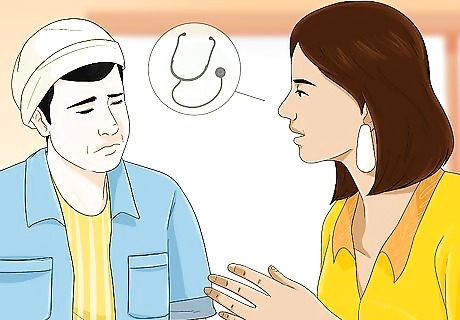
If your boyfriend is embarrassed, remind him that his health matters. Unfortunately, the shame and stigma that STIs have can often keep people from seeking the medical care they need. Reassure him that there is nothing to be ashamed of when it comes to getting help, and say something like: “Can I schedule you an appointment at the clinic I went to? It’s really nice.” “How about if we go together to the clinic tomorrow?” “It’s really important that you take care of this as soon as possible.”
Have a blame-free conversation.
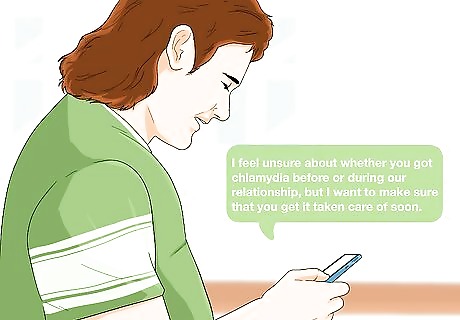
It’s okay to be upset, but keep the conversation constructive. Even if you have suspicions that your boyfriend was unfaithful to you, try to separate this conversation from the one you’ll need to have about taking care of your sexual health. Using “I-statements” is a good way to keep the conversation blame-free and focused on what matters most at this moment: staying healthy. Say something like: “I feel a little confused and hurt by how I got chlamydia, but I think we should focus on getting treated first.” “I feel unsure about whether you got chlamydia before or during our relationship, but I want to make sure that you get it taken care of soon.” “I want you to know that I think of STIs as a normal part of being sexually active, and I don’t hold this against you.”
Be prepared to deal with a variety of responses.
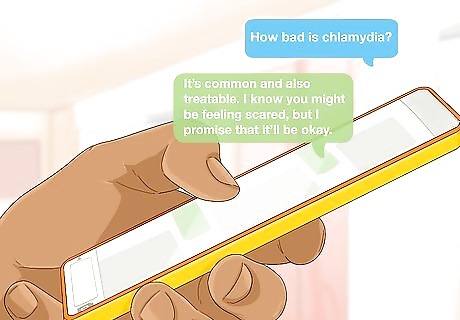
Anticipating his questions can allow you to prepare answers. Try putting yourself in your boyfriend’s shoes and seeing what questions he might have about his health or your relationship. Then, plan your responses ahead of time. For example: If he asks, “How bad is chlamydia?” you can say something like, “It’s common and also treatable. I know you might be feeling scared, but I promise that it’ll be okay.” If he asks, “How do you know you didn’t give me chlamydia?” you can say something like, “It’s possible that I got it from a partner before our relationship and didn’t know. I don’t think either of us can know who gave it to whom.” If he asks, “Are you angry at me?” you can say something like, “I think I need some time. I can’t say that this is proof that you slept with someone else during our relationship, but once we get treated, we’ll need to have an honest conversation.”
Address issues in your relationship.

After discussing your health, communicate how you feel. Although an STI diagnosis doesn’t have to change anything between you two, it can be a good time to remind each other of what boundaries you’ve set in your relationship. If you believe you’re monogamous (exclusively seeing each other), making boundaries clear in your relationship is an important way to prevent further STIs. Bring up your relationship by saying something like: “Now that we’ve talked about our health, I want to tell you that lately, I’ve felt like we need more clarity on whether or not we’re monogamous, and what that means to each of us.” “I feel like I need some reassurance about our relationship. If you did sleep with someone else, I think we’ll need to talk about what this means for us as a couple.” “I know that our relationship is open, but I think we need to talk about using protection when we’re with other partners. Since chlamydia can be transmitted orally, I’d like us to commit to either avoiding oral sex with others or using protection.”
Open the conversation to questions.

Allowing your boyfriend to ask questions is part of good communication. After you’ve notified him about your diagnosis and talked about what this might mean for your relationship, invite him to let you know what’s on his mind. It’s okay if he doesn’t feel like talking—sometimes people take a while to process this information. A good conversation is always two-way, so tell him something like: “Do you have any questions about chlamydia? I’m not an expert, but I’ve been reading a lot about it since I got tested.” “I know this can feel like a lot to take in. How are you feeling?” “Okay, I know that was a lot of information, but is there anything you wanted to share with me?”
Ask your doctor to notify your boyfriend if you’re scared.
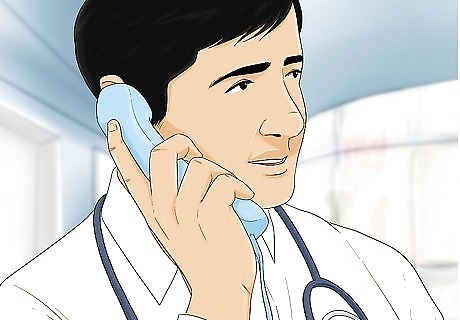
If this isn’t a conversation you can handle, your doctor might help. Although not all doctors will be willing to call your boyfriend on your behalf, they can counsel you through this conversation and offer helpful resources on chlamydia to show your boyfriend. But if you want to try asking your doctor to give your boyfriend a call, say something like: “I’m really worried about my boyfriend’s reaction to the news. I know you’re busy, but do you think you could give him a call for me?” “I know that I have to be responsible and let my boyfriend know he needs to be treated, but I can’t do it myself. Could I ask you to talk to him?” “I’m not sure if you’ve done this before, but would it be possible for you to let my boyfriend know he needs to be treated?”



















Comments
0 comment